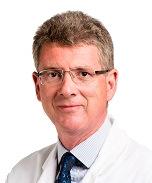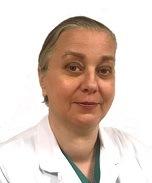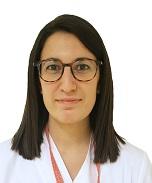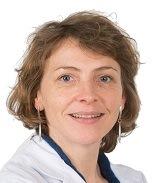Oesophageal cancer

Summary/Epidemiology
Oesophageal cancer is a relatively rare cancer when compared with colon or rectal cancers. It can originate in any part of this organ and most frequently develops from mucosal cells. Two types can be distinguished: Squamous cell carcinoma (SCC) and adenocarcinoma. A distinction is made between these different types of cancer based, in part, on their location. Squamous cell carcinoma is most frequently found in the upper and mid sections of the oesophagus, while adenocarcinoma is often located in the lower third.
Risk factors
Some risk factors are well-known. These are alcohol and tobacco consumption for squamous cell carcinoma. Another risk factor is unique to adenocarcinoma: Barrett's oesophagus. This disease is mainly associated with long-term GERD and obesity, which contributes to the reflux.
Symptoms
A “blockage” in the oesophagus, called dysphagia, constitutes a warning sign that requires an endoscopic examination.
Diagnosis
Microscopic examination of fragments taken during endoscopy is used for definitive diagnosis. Cancer developing from Barrett’s oesophagus is seen frequently in our facility. This is why we offer patients with this condition regular endoscopies to detect it at a very early stage.
Treatments
How these cancers are treated depends on their extent, location and any associated diseases. There are several different situations:
If the tumour is superficial, curative endoscopic excision is a treatment option that reduces potential complications and the duration of hospitalisation. This treatment, called a mucosectomy, is carried out in expert centres for therapeutic endoscopy, as it requires a meticulous technique. If the tumour is very superficial (dysplasia for example in Barrett’s oesophagus), it can also be destroyed by radiofrequency (a probe is used to burn the superficial part of the oesophageal lining). This treatment is offered in certain expert centres, including ours.
For non-superficial tumours, i.e. those that invade the deeper layers of the oesophageal or stomach lining, surgery is the reference treatment regardless of the type of cancer (squamous cell carcinoma or adenocarcinoma). This operation, called oesophagectomy, consists of removing all or part of the oesophagus. The main element of this surgery is the radical ablation of all lymph nodes surrounding the organ affected by the tumour. Reconstructive surgery is carried out at the same time to re-establish the continuity of the digestive tract. This reconstruction is most often carried out using the stomach, but sometimes the colon or the small intestine.
Carried out exclusively in a small number of specialised, accredited centres (including ours), these procedures are often long and intricate. They require a team of expert surgeons and experienced anaesthetists and an Intensive Care Unit. The close collaboration which exists between the different actors guarantees optimal care for patients, reducing to a minimum the risks associated with the surgery.
In some cases, the examinations carried out show the extensive presence of a tumour (referred to as locally advanced). We thus offer patients a treatment spread over five weeks that combines radiotherapy and chemotherapy in order to reduce the size of the tumour and reduce the risk of post-surgical recurrence. This is called preoperative radiochemotherapy because it is followed by surgical resection, as is the case for localised tumours.
Finally, for patients for whom surgery is contraindicated or who are too vulnerable to undergo surgery, the combination of radiotherapy and chemotherapy alone is sometimes proposed, with satisfactory results. Both radiotherapy and radiotherapy are administered as outpatient treatments, with radiotherapy over 6 weeks and chemotherapy often spread over a period of three months.
If the cancer has reached organs at some distance from the oesophagus or the stomach, i.e. it has metastasised, only chemotherapy can be of some benefit, controlling the disease and its symptoms and increasing the patient’s life expectancy. If the tumour obstructs the digestive tract and prevents food from being swallowed, an oesophageal prosthesis (a tube inserted into the oesophagus) can be used to allow patients to continue eating via the mouth.
Treating patients requires close collaboration between medical oncologists, radiotherapists, surgeons, anatomical pathologists, radiologists, nuclear medicine specialists and gastroenterologists. This multidisciplinary team meets each week with the objective of proposing the best possible care for each patient. They are assisted by specialist oncology nurses (care coordinator), psychologists, dieticians, physiotherapists, etc. to ensure a holistic, optimised approach to patient care.
Research / Innovation
Studies investigating oesophageal cancer mainly focus on: Evaluating different ways of using existing treatments or their combination (endoscopy, surgery, chemotherapy, radiotherapy) in order to improve their efficacy or reduce their side effects (associated with drug combinations, for example); Testing innovative treatments; Identifying new treatments.
National accreditation
With a view to improving the care of patients with an oesophageal pathology, the Belgian National Institute for Health and Disability Insurance (INAMI), at the urging of the Ministry of Health, has established a centralised registry of hospitals with sufficient expertise to treat these pathologies.
From 1 July 2019, only hospitals carrying out at least 20 operations per treatment may offer these surgical procedures to treat oesophageal cancer and are identified as specialised centres. A total of 10 centres have obtained this accreditation in Belgium, including the Cliniques universitaires Saint-Luc. From 1 January 2020, only surgeries carried out in these accredited specialised centres are eligible for reimbursement from the Belgian social security system.
This ensures that specialised care, and in particular complex, highly technical, high quality surgical procedures are carried out in a suitable environment where the expertise of our team is recognised. The accreditation of our centre enables us to continue to offer our patients high quality surgical management for oesophageal pathologies via complex, multidisciplinary care based on close collaboration between the various medical and paramedical actors.
It is in part thanks to the cooperation between the hospitals in our new network that we are able to offer high quality care. In turn, this requires a considerable commitment from medical and paramedical personnel.
Contact
For any further information, or if you would like to make an appointment, please contact the Oncology Care Coordinator at + 32 2 764 42 15.
Doctor

Dr Hélène DANO

Pr Etienne DANSE

Dr Astrid DE CUYPER

Pr Pierre H. DEPREZ

Dr Yannick DESWYSEN

Dr Cristina Anca DRAGEAN

Pr Hubert PIESSEVAUX

Dr Maximilien THOMA

Pr Marc VAN DEN EYNDE

Pr Geneviève VAN OOTEGHEM
Paramedical

Anouck DEL SOLO RINONES

Florie EVERARD

Funda KUTLU

Tuan LE TRONG

